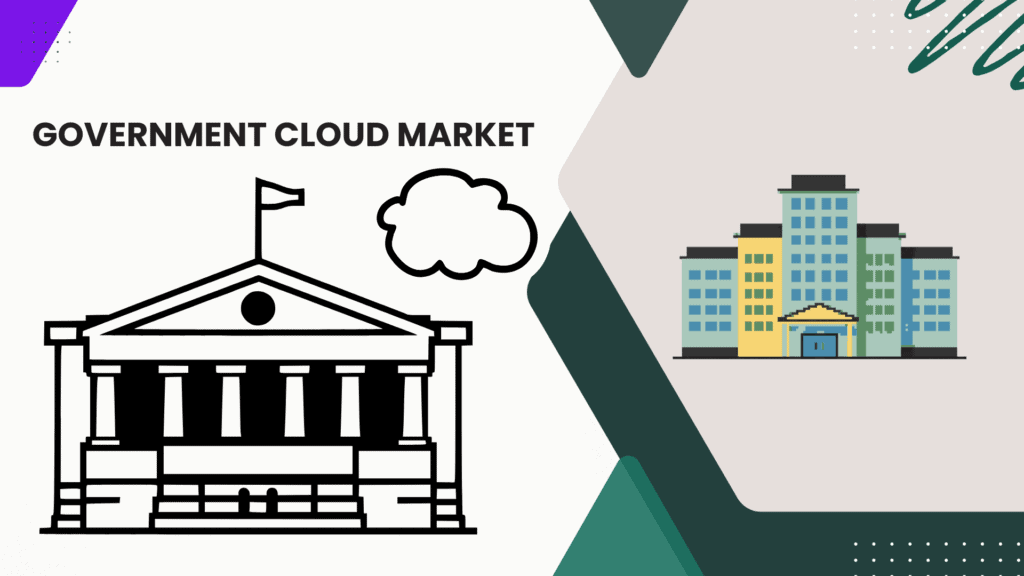Government Cloud Market Size
The global Government Cloud Market was valued at USD 33.21 billion in 2023 and is projected to reach around USD 140.2 billion by 2033, expanding at a strong CAGR of 15.49% during 2024-2033. Growth is being driven by rising adoption of digital transformation initiatives across government agencies, the need for secure and scalable infrastructure, and increasing demand for cost-effective data management and citizen service platforms.
In 2023, North America held a dominant market share of over 40%, generating revenues of about USD 13.2 billion. The region’s leadership is supported by strong cloud adoption policies, significant government investment in IT modernization, and collaboration with leading technology providers. These factors continue to position North America as the primary hub for government cloud deployment and innovation.

Key Insight Summary
- The global government cloud market is expected to grow from USD 33.21 billion in 2023 to USD 140.2 billion by 2033, at a 15.49% CAGR.
- Solutions dominated with over 65% share in 2023, reflecting strong demand for secure and scalable platforms.
- The Public Cloud led with more than 38% share in 2023, showing government preference for cost-effective deployment.
- IaaS accounted for over 42% share in 2023, driven by need for flexible infrastructure services.
- North America captured over 40% share in 2023, generating USD 13.2 billion, supported by advanced cloud adoption and investments.
Market Overview
The Government Cloud Market refers to the use of cloud computing solutions by public sector organizations to deliver digital services, manage data, and improve operational efficiency. It includes infrastructure-as-a-service (IaaS), platform-as-a-service (PaaS), and software-as-a-service (SaaS) offerings tailored to government requirements. These services enable agencies to modernize IT infrastructure, improve scalability, strengthen security, and deliver citizen-centric applications.
Government cloud deployments are typically structured as public, private, hybrid, or community cloud models, depending on regulatory needs and sensitivity of data. Top driving factors in this market include growing government efforts to digitize public services and the increasing need for secure data handling. Governments face rising threats of cyberattacks and breaches, which makes secure cloud platforms with strong compliance standards essential.
Demand for government cloud solutions is strong across federal, state, and local agencies. Central governments are adopting large-scale platforms to manage citizen records, taxation, healthcare, and social welfare programs. Local administrations are using cloud services for smart city projects, digital document storage, and public safety systems. Law enforcement, defense, and healthcare agencies represent significant demand due to the need for secure, high-performance cloud environments.
Analysts’ Viewpoint
The market is witnessing rapid adoption of advanced technologies integrated with cloud platforms. Artificial intelligence and machine learning are being applied to enhance decision-making, automate administrative tasks, and analyze large volumes of public data. Blockchain is being integrated into government clouds to ensure data integrity and transparency in transactions. Edge computing is gaining traction to support real-time decision-making in defense, traffic management, and public safety.
Multi-cloud and hybrid cloud approaches are being adopted to balance security, flexibility, and cost efficiency. There are strong investment opportunities in cloud platforms designed specifically for public sector compliance and security needs. Vendors offering solutions that meet local data sovereignty requirements and align with national cybersecurity frameworks are well-positioned. Partnerships between governments and technology providers create opportunities for long-term contracts and infrastructure development.
Investment in specialized solutions such as defense cloud, healthcare cloud, and smart city platforms presents further growth prospects. Emerging economies with large-scale digital government initiatives represent additional opportunities. Adopting government cloud solutions provides agencies with improved agility, lower infrastructure costs, and enhanced security. Centralized platforms streamline service delivery and reduce duplication of IT resources. Cloud adoption enables governments to innovate faster, launch new services more efficiently, and provide citizens with reliable digital experiences.
Government Cloud: Role of Generative AI
Generative AI is becoming a key tool in government cloud environments, transforming how public services are delivered and managed. In 2025, about 64% of government organizations recognize the critical importance of AI adoption, yet only around one-quarter have fully integrated AI across their operations. Generative AI enhances efficiency by automating routine processes, improving decision-making, and enabling continuous analysis of data. It supports policy design, regulatory compliance automation, and operational planning in government functions.
The technology also accelerates technology development and optimizes IT infrastructure, improving responsiveness to citizen needs and resource allocation. This widespread generative AI adoption is expected to generate significant productivity gains across public sectors worldwide, making government cloud platforms smarter and more adaptive.
Emerging Trends
The government cloud market is embracing a shift towards private cloud environments as a strategic priority alongside public cloud use. Enhanced security features, generative AI integration, and cost predictability are major factors driving this shift. Hybrid cloud models are growing in popularity, supported by tools that simplify migration and management.
Governments are adopting cloud-native applications extensively, and there is a rising demand for scalable, agile infrastructure to handle real-time data and large-scale analytics. Cloud solutions in government increasingly focus on compliance with data sovereignty and privacy regulations while also enabling AI-driven citizen service platforms and inter-agency communication. These trends indicate a move towards more secure, flexible, and AI-enabled cloud ecosystems in the public sector.
Growth Factors
Several drivers support the growth of government cloud adoption. Governments aim to digitize public services to improve accessibility and efficiency, backed by significant investments in IT infrastructure modernization. Cost savings from cloud migration, especially by reducing traditional data center expenses, are compelling incentives. Enhanced cybersecurity measures and compliance frameworks reduce risks and build trust in cloud solutions.
The growing adoption of AI and machine learning in government tasks such as policy analysis, resource management, and citizen engagement boosts demand for advanced cloud platforms. Increasing regional investments, particularly in North America, Europe, and Asia-Pacific, also support market expansion. The continuous modernization of legacy systems and demand for scalable, flexible technologies remain strong growth stimulants.
Driver Analysis
Growing Need for Data Security and Compliance
Governments are increasingly focused on protecting sensitive information, which drives the adoption of government cloud solutions. The rise in cyber threats and strict regulations require cloud systems to comply with robust data protection standards. These demands encourage governments to shift from legacy systems to cloud platforms that can guarantee secure data storage and management within national boundaries. This focus on security and regulatory compliance boosts confidence in cloud adoption and supports operational resilience.
Secure cloud solutions help public sector organizations control access and maintain compliance with regulations such as FedRAMP and GDPR. Consequently, governments prioritize cloud platforms that address these security needs, helping streamline their IT modernization efforts while ensuring citizen data is safeguarded effectively.
Restraint Analysis
Complex Regulatory Environment
One of the main restraints for government cloud adoption is the complex, varied, and evolving regulatory landscape. Different countries and regions impose stringent rules on data sovereignty, privacy, and cross-border data transfers. Navigating these regulations makes it difficult for governments to adopt cloud solutions rapidly and uniformly. Compliance requirements often entail additional costs and time for cloud migration and upkeep, causing delays in cloud adoption initiatives.
Moreover, governments must handle the challenge of integrating cloud services with existing legacy infrastructure while ensuring compliance. This complexity sometimes slows down digital transformation efforts, as agencies want to avoid risks related to data breaches or regulatory non-compliance.
Opportunity Analysis
Expansion of Cloud-Based Public Services
Government cloud platforms offer a significant opportunity to improve public service delivery toward citizens and businesses. Cloud technologies enable faster, more scalable, and efficient IT infrastructure supporting digital government initiatives like e-governance, smart city solutions, and emergency response systems. The ability to share data securely across multiple agencies increases collaboration and responsiveness, improving overall service quality.
As governments aim to modernize their operations, cloud-based platforms allow for innovative public applications such as AI-based analytics, real-time data access, and enhanced citizen engagement. This creates opportunities for tailored cloud solutions meeting unique governmental needs, driving adoption and further market growth in the public sector.
Challenge Analysis
Ensuring Cloud Security and Building Trust
Security remains the biggest challenge in government cloud adoption. Governments must protect highly sensitive data from cyberattacks and unauthorized access while guaranteeing continuous service availability. Establishing strong cybersecurity measures is vital but can be difficult given the increasing complexity of threats and the rapid evolution of cloud technology.
Additionally, gaining trust among government stakeholders and the public on cloud reliability and security is essential. Agencies often hesitate to move critical workloads to the cloud without clear evidence of security effectiveness. Overcoming these concerns requires continuous investment in advanced security frameworks, transparent compliance practices, and robust disaster recovery plans.
Key Market Segments
By Component
- Solutions
- Services
By Deployment Mode
- Public Cloud
- Private Cloud
- Hybrid Cloud
By Service Model
- Infrastructure-as-a-Service
- Platform-as-a-Service
- Software-as-a-Service
Top Key Players in the Market
- Amazon Web Services Inc.
- CGI Inc.
- Cisco Systems Inc.
- Dell Inc.
- Google Inc.
- IBM Corporation
- Microsoft Corporation
- NetApp Inc.
- Oracle Corporation
- Rackspace Inc.
- Salesforce.com Inc.
- VMWare Inc.
- Other Key Players
Read More – https://market.us/report/government-cloud-market/












